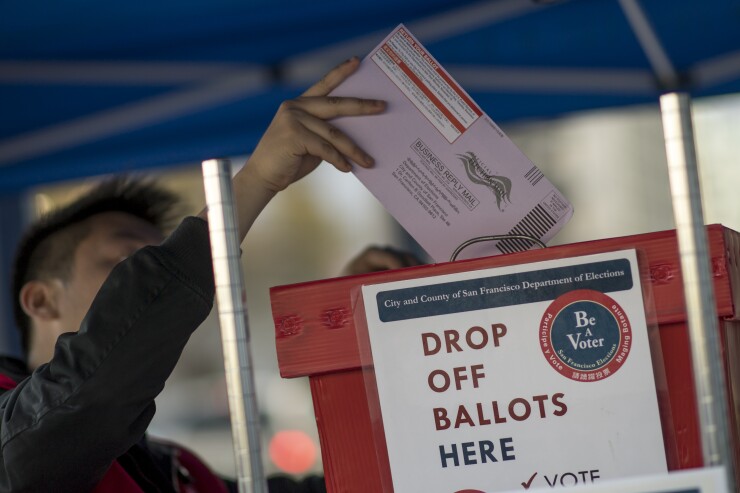A pair of California Superior Court
The decisions are credit positive, “because a simple majority requirement provides more flexibility to raise revenue through voter initiatives,” according to a Moody’s Investors Service team led by Helen Cregger.
In separate decisions July 5, the San Francisco judge ruled against a lawsuit that challenged two tax measures city voters passed last year to fund early education and combat homelessness.

The anti-tax Howard Jarvis Taxpayers Association argued that under California law the measures needed to be approved by two-thirds of voters, not the simple majority achieved. An adverse ruling would have made it more difficult for voters to tax themselves to support programs.
Californians typically support tax increase proposals, Moody’s analysts said, but they approve a greater percentage of ballot questions that do not require a two-thirds majority.
“Even during the recession, voters approved the majority of tax increases that did not require two-thirds approval,” analysts said. “In contrast, fewer proposals requiring a supermajority passed, and fewer than half passed in 2010, as the state emerged from the Great Recession.”
San Francisco Superior Court Judge Ethan Schulman ruled that Proposition C from the June 2018 ballot and Proposition C from the November 2018 both needed a simple majority to pass.
The city argued that because the measures were placed on the ballot through voter signatures, and not by city leaders, they needed only a simple majority to pass. Opponents contended that both measures constituted a “special tax” and should have required two-thirds voter approval. Special taxes are those designated for a specific purpose.
Judge Schulman cited a similar ruling in the 2017 Supreme Court case California Cannabis Coalition v. City of Upland, which also considered whether voters’ ability to impose taxes via ballot initiatives was also limited. The judge ruled that limits placed on state and local governments’ ability to collect taxes through constitutional changes was not intended to limit voters’ rights.
Ballot measures in Oakland and Fresno, also approved by a simple majority, not a two-thirds super majority, are on hold pending legal challenges. No taxes have been collected.
Oakland’s Measure AA is a parcel tax increase to fund early childhood education programs and passed with a 62.47% vote in November. The tax imposes a $198 tax per parcel for 30 years. A homeowners’ and landlords’ group filed suit arguing the certification of Measure AA by Oakland was illegal.
Fresno’s Measure P is a 0.375% sales tax increase for 30 years to fund city parks, recreation, streets and arts. It garnered 52.17% of the vote, but the city determined that because it was a special tax it did not pass. Fresno Building Healthy Communities filed suit against the city arguing a two-thirds supermajority vote was not required and the Fresno city attorney filed suit on the same day seeking a determination on the correct vote requirement for the measure.





